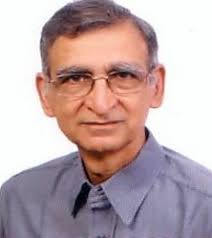19

Prof Ram Puniyani
New Delhi | Monday | 19 August 2024
Recent events in Bangladesh have led to a significant upheaval, highlighting the country's internal tensions and sparking a wave of fake news and Islamophobia in neighbouring India. Sheikh Hasina, who has ruled Bangladesh with a firm hand for the past fifteen years, has faced criticism for her authoritarian approach, particularly her suppression of opposition voices. Major opposition leaders have been imprisoned or placed under house arrest, leaving little room for dissent.
The catalyst for the current unrest was the student protests over "reservations for freedom fighters' children," an issue that has lingered unresolved for nearly fifty years since Bangladesh gained independence from Pakistan. The youth, frustrated by the government's inaction, took to the streets, only to be met with harsh suppression by the Hasina government, leading to widespread discontent and chaos.
When Sheikh Hasina left the country, the situation spiralled out of control. Supporters of the Awami League, Hasina's party, were targeted, and party offices were set on fire. According to the "Hindu Buddhist Christian Unity Council" and the "Bangladesh Puja Udjapan Parishad," minority communities in Bangladesh experienced 205 attacks across 52 districts since the fall of the Hasina government on August 5. In response to the escalating violence, Professor Muhammad Yunus emerged as the interim leader chosen by the student protesters. In a powerful and heartfelt appeal, Professor Yunus urged the protesters to protect all minority communities, including Hindus, Christians, and Buddhists. He poignantly asked, "Are they not the people of this country? You have been able to save the country. Can't you save some families?"
This appeal had a significant impact. Mahfouz Anam, editor of Bangladesh's *The Daily Star*, noted that the violence against Hindus subsided considerably, even to the extent that the right-wing Jamaat-e-Islami formed teams to protect temples. In an interview with Karan Thapar of *The Wire*, Anam highlighted how right-wing factions in both Bangladesh and India feed off each other's narratives. He observed that after five days, attacks on minorities came to a complete halt. However, in India, rumours and fake news continued to spread unchecked, further inflaming communal tensions.
----------
----------
One notable example of misinformation was the claim that cricketer Leepan Das's house was set on fire. A BBC fact-check revealed that the house belonged to another cricketer, close to the Awami League, who had served as a Member of Parliament for two terms. Similarly, visuals purportedly showing a temple burning in Chittagong were, in reality, of an Awami League office near a temple. These examples highlight how misinformation can distort reality and exacerbate communal tensions. Fact-checkers like Shohanur Rahman have pointed out that while both Hindus and Muslims are victims, politically motivated attacks are often selectively highlighted as communal violence, thereby increasing anti-Muslim sentiment in India.
Currently, the two major forces in Bangladesh are Professor Yunus and the student protesters. Both advocate for an inclusive Bangladesh and are committed to protecting Hindus and other minorities. Although Jamaat-e-Islami harbours dreams of establishing an Islamic state, and Khaleda Zia of the Bangladesh Nationalist Party (BNP) also supports a pro-Islamic state agenda, the tide appears to be turning in favour of the inclusive approach championed by Yunus and the students. In a reassuring gesture, Professor Yunus visited the Dhakeshwari Temple on August 13, 2023, where he met with Hindu leaders to express solidarity and assure them of their safety.
In India, however, hate-mongers and proponents of Hindu nationalism continue to spread divisive rhetoric. BJP MP Kangana Ranaut, for example, tweeted incendiary remarks that echoed calls for violence, further polarising the situation. Such actions underscore the importance of standing up for the rights of religious minorities, both in Bangladesh and at home.
South Asia is currently grappling with a wave of sectarian nationalism. Recent events in Sri Lanka, Pakistan, and Myanmar serve as stark reminders of this dangerous trend. Those who engage in hate speech and incite violence often go unpunished, further deepening societal divides.
The responsibility of those who believe in pluralism and democracy is immense. Hate-mongers have built extensive networks to propagate their divisive agendas. In contrast, those who advocate for peace and harmony must expand their efforts, intensify fact-checking, and combat misinformation with truth.
Sheikh Hasina's rule has been marked by a duality—authoritarianism on one hand, and the survival of pluralism on the other. Moving forward, Bangladesh must implement both pluralism and democracy in full measure. Professor Yunus's recent actions offer hope for secularism in Bangladesh. It is our collective duty to promote intercommunity relations, support affirmative action for minorities, and stand firmly for the human rights of all, while unequivocally rejecting hate-mongering against any community.
---------------



















































































































































































































































































































































































































































































































































































































































































































































































































































































































































































































































































































































































































































































































































































































































































































































































































































































